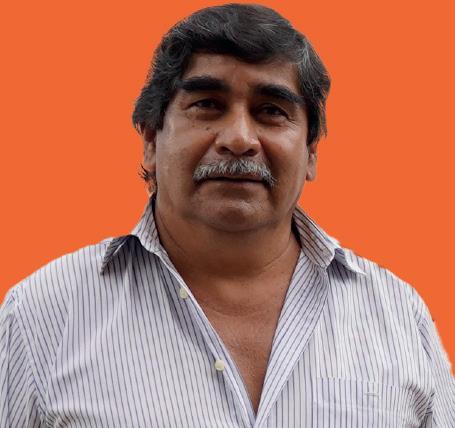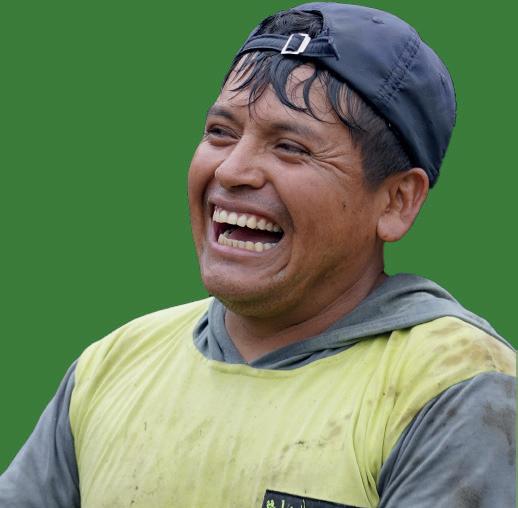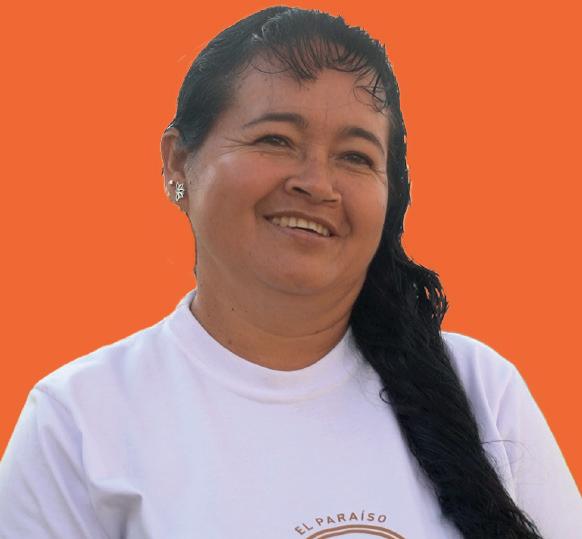
8 minute read
DONGUSTAVO
Ich liebe es, die Natur zu verteidigen. Alle Verbände müssen für das Gemeinwohl (bien comun) kämpfen. Wir wollen das Erbe, das uns unsere Eltern hinterlassen haben, an unsere Kinder weitergeben, denn der biologische Anbau von Panela kann noch mehr als 200 Jahre weitergeführt werden, aber mit dem Minenabbau wird das alles ein Ende haben. Der Extraktivismus kann wahrscheinlich zu größerem Wohlstand führen, aber nur für 20 oder 30 Jahre... danach wird unser Land unfruchtbar sein oder wir werden keine Möglichkeit mehr haben, als Bio-Produzenten von Panela zu exportieren, weil der Boden verseucht sein wird. Bergbaukonzessionen sind nicht legal! Auch der Staat profitiert nicht von ihnen, da sie nicht legal sind. Diejenigen, die davon profitieren, sind nur wenige... es ist eine Lüge, dass sie den Menschen hier Arbeit geben werden, es werden Vertriebene kommen, Arbeiter von anderswo, billige Arbeitskräfte, wie Venezolaner oder Kolumbianer, die für weniger arbeiten werden, das heißt, sie werden ihnen keinen fairen Preis zahlen und die sozialen Bedingungen werden sich verschlechtern...
In the cooperative there is no discrimination against women: we have all the same rights. We work in the fincas from 6 a.m. until 4 p.m. and we go back home to cook and take care of the family. At the same time, we have to take good care of the crops so that they will produce good quality sugar cane and good panela. We have been looking for a future, for better days for ourselves and for our families. That’s why we joined COPROPAP. Because people were forced to look around for selling the product to anyone who came along... brokers, you know? And we saw that it wasn’t good to live and work like that, “by ourselves”… everyone with his own business… and that’s why we joined the cooperative. COPROPAP is a union of families that gives work to many other families because now we export our panela, and that is why we are happy. People abroad value our work, our product and our fight for human rights.
Advertisement
Representante
COPROPAP was born in the community of El Paraíso in 1992. In previous years the situation for the paneleros was very critical: they were all turning their crops into pastures… because of the brokers, who decided the prices… the paneleros were very poorly paid and they were living in very bad conditions. That’s why we decided to join and create a cooperative in order to sell together to a regular market. We created micro-enterprises and we brought economic stability to the families. We wanted to avoid young people to leave and look for a job in the big cities. Going out to study was good, but they had to come back to work with their families again. Now we have the dream of building a central production plant, a central factory where we can produce panela, giving opportunities to new producers who no longer have to worry about setting up an activity on their own. They will have to take care of the cultivation and only deliver the raw sugar cane to the central plant, always complying with the objectives of the cooperative, which are not only fair trade, but also social development and environment.


La cooperativa para mí es mi familia, mi vida. En el noviembre 2021 me eligieran como presidenta, y ahora que estoy en la cabeza de la cooperativa, estoy responsable para hacerla crecer. La panela es un buen producto: tiene mucho calcio, mucho hierro, es bueno para la crianza, ... Hemos tenido muchos talleres para conocer las propiedades y virtudes de la caña de azúcar y queremos seguir progresando y dar a la juventud la oportunidad de aprender todos lo que nosotros ya aprendimos, así que se puedan quedar aquí porque aquí está el futuro. Nuestros hijos, que ya trabajan con nosotros, no queremos que se van, que emigren, que sufran. ¡Aquí es la vida! ¡Todo lo que tú siembra, se produce! ¡Todo lo que tú piensa que esto no se va a criar, aquí crea! ¡Por eso amamos a la Tierra! ¡Si luchar por la Tierra significa dar la vida, la daremos! ¡Lucharemos, para nosotros y para todos! Nosotros somos más fuerte y más resistente si sabemos que luchamos para nuestra madre tierra. Es nuestra Pachamama, es la madre de nosotros.

Emigrai dalla Colombia all’Ecuador e sono qua da 28 anni. Nella finca ci lavoro io con mio marito e i miei figli. La mia vita forse non è tanto bella, sicuramento ho sofferto, sì, ma sono qui e continuo a lottare. Per esempio, siamo già da due anni al presidio Y de la Victoria. Abbiamo presidiato anche Santa Teresita e Ingapi dall’arrivo delle compagnie minerarie. Ci svegliavamo, andavamo a lavorare i campi, e poi via, al presidio, e a volte dormivamo sotto un telo di plastica così messo male che se pioveva ci bagnavamo, però era giusto così. È questa la lotta di noi poveri contadini. E ci tocca resistere anche per quelli della città ed è giusto che lo sappiano! È importante che si rendano conto che loro vivono grazie a noi, grazie ai prodotti della nostra terra, del nostro lavoro. Se non fosse per noi, di cosa si nutrirebbe la città?



La mia battaglia inizia dall’accesso all’acqua. Tante volte le imprese minerarie hanno richiesto concessioni per sfruttare le acque del Rio Chilupe e del Rio Chirapi, i nostri fiumi. Per fortuna non ho combattuto solo: senza l’appoggio del territorio non saremmo mai riusciti a interrompere tutti i lavori delle compagnie minerarie! Abbiamo fatto cose che nessuno aveva mai fatto, siamo addirittura entrati nelle gallerie delle miniere per documentare il lavoro illegale che stava procedendo anche senza concessione. È da quel momento che sono cominciate ad arrivarmi minacce di morte… è pericoloso per me, ma non ce la faccio a smettere di partecipare alla lotta. Io sono qui per questo. Se abbandoniamo la lotta proprio adesso, allora tutto quello che abbiamo fatto negli scorsi vent’anni non è servito a niente… ci siamo esposti così tanto che dobbiamo continuare. Non stiamo facendo niente di male, stiamo solo difendendo il nostro territorio! È un peccato questo? Qui c’è il nostro futuro, il futuro di tutti, non solo degli ecuadoriani, ma di tutti, perché un territorio così bello che ci da una terra così produttiva non si può lasciare allo sfruttamento delle miniere. La miniera ci darà forse il pane per l’oggi, ma non per il domani.
Do Adiana
Der Kampf gegen den Minenabbau dauert nun schon mehr als 20 Jahre an. Früher lag der Bergbau außerhalb von Pacto. Jetzt werden sie hierher kommen... aber hier sind wir Zuckerrohrbauern und 100% biologisch. Hier in Santa Teresita wie auch in Ingapi haben wir einen großen Zusammenhalt und wir lassen keine andere Gemeinde in diesem Kampf allein. Wenn der Bergbau Einzug hält, wird er viele schlechte Dinge mit sich bringen. Die Unternehmen füllen sich die Taschen, sie nehmen sich, was sie wollen, und uns bleibt nichts übrig. Deshalb fühle ich mich bei COPROPAP sehr wohl, denn wir produzieren nicht nur Panela, sondern wir arbeiten auch in vielen anderen Bereichen zusammen, und ich bin immer bereit zu helfen, wo ich kann. Ich fühle mich durch COPROPAP sicherer, denn außerhalb der Genossenschaft ist es sehr kompliziert, die Preise sind sehr niedrig. Die Frauen hier in Ecuador sind sehr unternehmungslustig und geschäftstüchtig. Panelera zu sein bedeutet, an unserem Leben aktiv teilzunehmen und unsere Familie zu unterstützen. Hier sind es Männer und Frauen, die auf dem Feld arbeiten.
Yo vivía en la ciudad, pero cuando mi abuelito falleció y dejó la finca, me vino aquí y empezó mi nueva aventura. Aquí conocí mi mujer, y ahora tenemos un hijo. Si es duro… pero aquí hay un aire puro, no hay tanta contaminación como en la ciudad, aquí es más lindo, y yo soy patrón de mi finca, no tengo que trabajar para otras personas. La minería nos afectaría mucho porque nosotros somos cañicultores orgánicos y tenemos que defender nuestra terra y nuestra agua. Esta lucha es mundial, porque el planeta es de todos. He aprendido mucho con COPROPAP. Cuando llegué, como joven, me sentía como un pollito chiquito porque los otros eran mayores, y pensaba “que bueno que me van a guiar”. Pero en el final aprendimos todos juntos, porque todos debían aprender algo.

COPROPAP è una cooperativa di produttori di zucchero di canna biologico, chiamato panela, con sede a El Paraiso, una frazione del comune di Pacto, nella provincia di Pichincha, in Ecuador.

Die Landwirte wohnen alle im Gemeindegebiet von Pacto, zu dem mehrere Comunidades gehören, wie Ingapi, Santa Teresa, La Delicia und El Paraiso, der Sitz der Genossenschaft. Trotz der großen räumlichen Distanz teilen die Paneleros die Liebe zu ihrem Land, die sie dazu gebracht hat, ein Gemeinschaftsgefühl zu schaffen und so die Zusammenarbeit und gegenseitigen Hilfe zu fördern.
Ogni produttore possiede la sua fi nca, il suo terreno, che può essere di diverse dimensioni (ca. 2-16 ettari). Ogni famiglia decide quanti ettari dedicare alla coltivazione della canna da zucchero, mentre i restanti possono essere utilizzati per altre coltivazioni, per il pascolo per il bestiame o semplicemente per la conservazione del bosco.
Die Mitglieder von COPROPAP besitzen auch eine eigene Produktionsstelle, in der sie die Panela herstellen. Diese sogenannte Unidade productiva besteht aus einem Trapiche, der Maschine zum Auspressen des Zuckerrohrs, einem Ofen zum Kochen des gewonnenen Rohrsaftes, mehreren Tanks, in denen der Rohrsaft zu Panela verarbeitet wird und einem Sieb, mit welchem die feine Panela von den Klumpen getrennt wird.
Per evitare di vendere il proprio prodotto singolarmente ad un mercato nazionale molto instabile, in cui il prezzo della panela al quintale era deciso dagli intermediari lasciando i produttori senza un guadagno giusto e dignitoso, i contadini di Pacto decisero di riunirsi per salvare i loro raccolti e di fondare una cooperativa.
Die Gründung einer Genossenschaft und das Engagement im fairen Handel war die beste Lösung, um dem kapitalistischen Schema zu entkommen und den Bauern und Bäuerinnen einen gerechten Lohn zu sichern: Der Preis der Panela wird von den Produzenten selbst bestimmt und beträgt heute 43$ pro Zentner Pfund. Die Einsatzbereitschaft und die Willenskraft der Mitglieder von COPROPAP hat ihnen die Möglichkeit gegeben, über den fairen Handel bis nach Europa zu exportieren: in Italien durch Altromercato, in Frankreich durch Solidarmonde. Die Genossenschaft wächst ständig. Dies konnte über die Jahre dank ihrer soliden Struktur ermöglicht werden.
Il prossimo obiettivo di COPROPAP è costruire una fabbrica che rimpiazzi tutte le produzioni artigianali dei singoli produttori. Se prima ogni contadino consegnava nelle mani della cooperativa la panela, cioè il prodotto finale, in un futuro molto prossimo ogni contadino consegnerà alla fabbrica centrale la materia prima, quindi le canne mature. Saranno poi i dipendenti della planta central, scelti tra le famiglie dei produttori, a occuparsi della trasformazione dello zucchero di canna. I singoli contadini potranno così dedicare più tempo e impegno alla cura del campo, migliorando la qualità e la quantità della materia prima, mentre la centralizzazione della produzione porterà ad un innalzamento degli standard qualitativi (già ora molto alti) della panela e aprirà così le porte a nuovi mercati.
È qui che si inserisce il Premio di Operation Daywork: i soldi della Giornata d’Azione verranno utilizzati per far fronte alle spese per il completamento della planta central !
Das nächste Ziel von COPROPAP ist der Bau einer Fabrik, die die gesamte handwerkliche Produktion der einzelnen Bauersfamilien ersetzen soll. Wenn jetzt jeder Bauer die Panela, also das Endprodukt, der Genossenschaft liefert, wird in naher Zukunft hingegen der Rohstoff, also das Zuckerrohr an die zentrale Fabrik geliefert. Einige Mitglieder der Bauersfamilien werden in der Planta central arbeiten und sich um die Verarbeitung des Rohrzuckers beschäftigen. So können sich die einzelnen Landwirte besser um ihren Acker kümmern und die Qualität, sowie die Quantität der Ernte steigern, während die Zentralisierung der Produktion zu einer Erhöhung der bereits sehr hohen Qualitätsstandards der Panela von COPROPAP führen wird. Dies wird ihnen die Türen für neue Exportmöglichkeiten eröffnen.
Hier kommt der Preis von Operation Daywork ins Spiel: Das Geld des Aktionstages wird für die Fertigstellung der Planta central verwendet!










